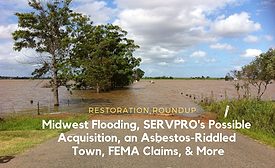Home » insurance claims
Articles Tagged with ''insurance claims''
Commercial Restoration Electronics & Textiles Best Practices
Approach, transparency, speed & peace of mind.
Read More
Restorer's Perspective
Nobody Cares About Your Restoration Company
Embracing extreme customer service.
Read More
Restoration Roundup: Deadly Flooding, SERVPRO's Possible Acquisition, Asbestos-Riddled Town, & More | 3.20.19
The latest headlines affecting the restoration industry.
March 20, 2019
Stay ahead of the curve with our eNewsletters.
Get the latest industry updates tailored your way.
JOIN TODAY!Copyright ©2025. All Rights Reserved BNP Media.
Design, CMS, Hosting & Web Development :: ePublishing












